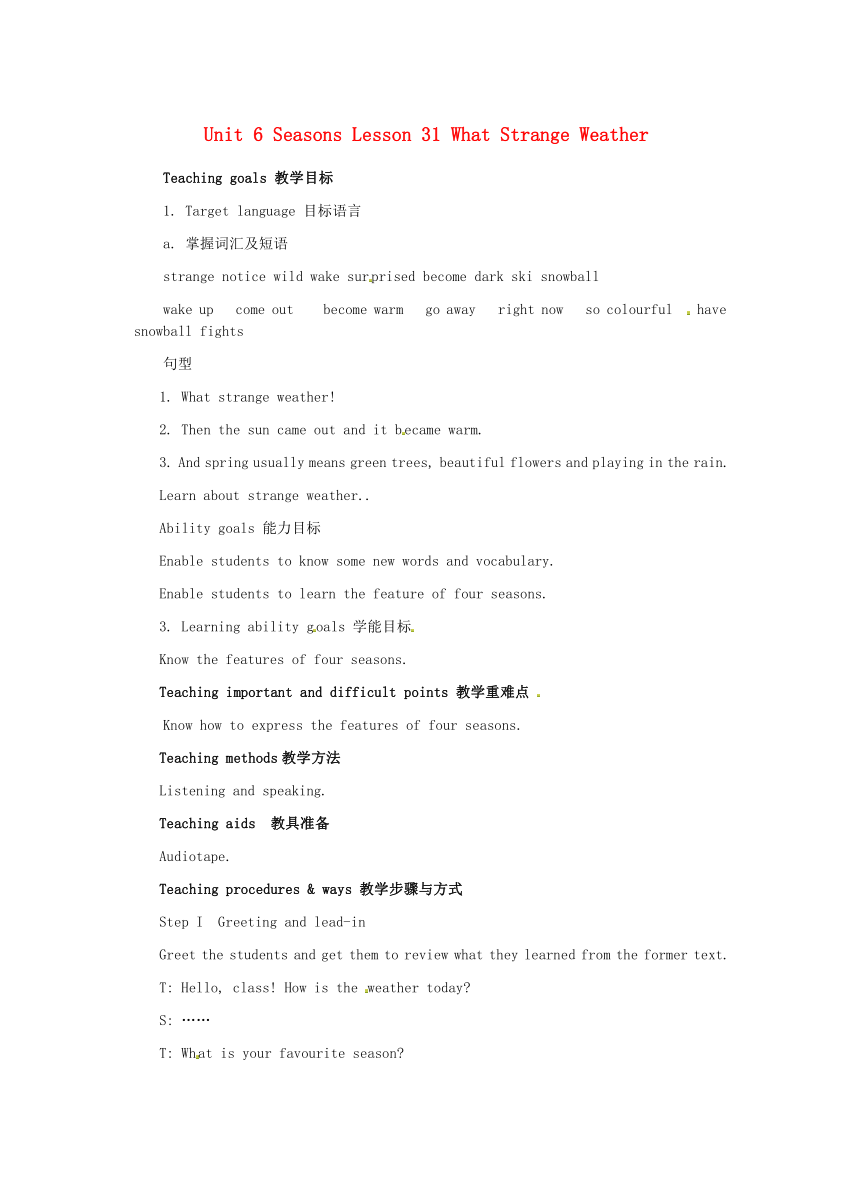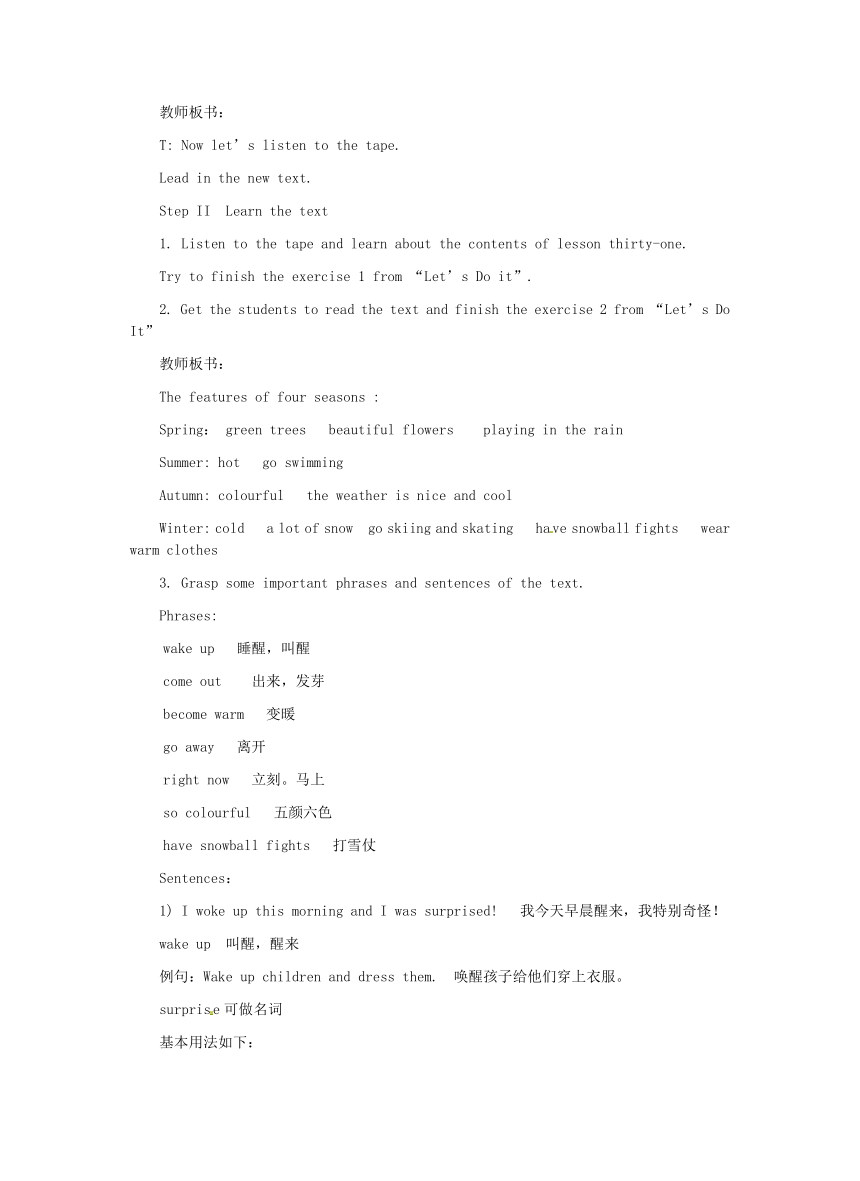Unit 6 Seasons Lesson 31 What Strange Weather教案
文档属性
| 名称 | Unit 6 Seasons Lesson 31 What Strange Weather教案 |

|
|
| 格式 | doc | ||
| 文件大小 | 110.0KB | ||
| 资源类型 | 教案 | ||
| 版本资源 | 冀教版 | ||
| 科目 | 英语 | ||
| 更新时间 | 2022-04-29 00:00:00 | ||
图片预览


文档简介
Unit 6 Seasons Lesson 31 What Strange Weather
Teaching goals 教学目标
1. Target language 目标语言
a. 掌握词汇及短语
strange notice wild wake surprised become dark ski snowball
wake up come out become warm go away right now so colourful have snowball fights
句型
1. What strange weather!
2. Then the sun came out and it became warm.
3. And spring usually means green trees, beautiful flowers and playing in the rain.
Learn about strange weather..
Ability goals 能力目标
Enable students to know some new words and vocabulary.
Enable students to learn the feature of four seasons.
3. Learning ability goals 学能目标
Know the features of four seasons.
Teaching important and difficult points 教学重难点
Know how to express the features of four seasons.
Teaching methods教学方法
Listening and speaking.
Teaching aids 教具准备
Audiotape.
Teaching procedures & ways 教学步骤与方式
Step I Greeting and lead-in
Greet the students and get them to review what they learned from the former text.
T: Hello, class! How is the weather today
S: ……
T: What is your favourite season
教师板书:
T: Now let’s listen to the tape.
Lead in the new text.
Step II Learn the text
1. Listen to the tape and learn about the contents of lesson thirty-one.
Try to finish the exercise 1 from “Let’s Do it”.
2. Get the students to read the text and finish the exercise 2 from “Let’s Do It”
教师板书:
The features of four seasons :
Spring: green trees beautiful flowers playing in the rain
Summer: hot go swimming
Autumn: colourful the weather is nice and cool
Winter: cold a lot of snow go skiing and skating have snowball fights wear warm clothes
3. Grasp some important phrases and sentences of the text.
Phrases:
wake up 睡醒,叫醒
come out 出来,发芽
become warm 变暖
go away 离开
right now 立刻。马上
so colourful 五颜六色
have snowball fights 打雪仗
Sentences:
1) I woke up this morning and I was surprised! 我今天早晨醒来,我特别奇怪!
wake up 叫醒,醒来
例句:Wake up children and dress them. 唤醒孩子给他们穿上衣服。
surprise可做名词
基本用法如下:
① 表示“惊讶”时,是不可数名词。常用短语:in surprise 惊讶地;to one's surprise 让某人惊讶的是
例句:To my surprise, he was a thief.
② 表示“令人惊讶的事务/意外之事”时,是可数名词
surprise还可以做及物动词,意思是“使...惊讶”。
常用短语:surprise sb
例句:His words surprised me a lot. 他的话使我大吃一惊。
派生词:① surprised 形容词,意思是“感到惊讶的”。常用结构:be surprised at sth 对某事感到惊讶
be surprised to do sth 做某事而感到惊讶
be surprised + that从句 因...而惊讶
② surprising 形容词,意思是“令人感到惊讶的”。
例句:He is very surprised to see Jay on the street.
The news is very surprising
2)And spring usually means green trees, beautiful flowers and playing in the rain.
mean v. 打算,意味
例句:I mean to call on you tomorrow. 我打算明天看望你。
Becoming a millionaire didn't mean an end to his money worries. 成为百万富翁并不意味着他不再被钱困扰。
mean to do sth 打算做某事 mean doing sth 意味着……
例:I didn’t mean to do that. 我不是故意要做那件事的。
Losing a bus in London means waiting for another hour. 在伦敦错过一般车意味着再等一个小时。
Grammar: What引导的感叹句讲解
由what引导的感叹句
what修饰名词或名词短语,有以下两种形式:
What+a(an)+(形容词)+单数可数名词+主语+谓语!
例句:What an apple this is!
What a fine day it is!
What+(形容词)+可数名词复数或不可数名词+主语+谓语!
例句:What kind women they are!
What nice music it is!
Step III
Work in groups and finish the exercise 3,4 from “Let’s Do It”.
Homework
a. Finish the exercises in Activity book.
b. Preview Lesson 32 and write a report about your favourite seasons.
PAGE
Teaching goals 教学目标
1. Target language 目标语言
a. 掌握词汇及短语
strange notice wild wake surprised become dark ski snowball
wake up come out become warm go away right now so colourful have snowball fights
句型
1. What strange weather!
2. Then the sun came out and it became warm.
3. And spring usually means green trees, beautiful flowers and playing in the rain.
Learn about strange weather..
Ability goals 能力目标
Enable students to know some new words and vocabulary.
Enable students to learn the feature of four seasons.
3. Learning ability goals 学能目标
Know the features of four seasons.
Teaching important and difficult points 教学重难点
Know how to express the features of four seasons.
Teaching methods教学方法
Listening and speaking.
Teaching aids 教具准备
Audiotape.
Teaching procedures & ways 教学步骤与方式
Step I Greeting and lead-in
Greet the students and get them to review what they learned from the former text.
T: Hello, class! How is the weather today
S: ……
T: What is your favourite season
教师板书:
T: Now let’s listen to the tape.
Lead in the new text.
Step II Learn the text
1. Listen to the tape and learn about the contents of lesson thirty-one.
Try to finish the exercise 1 from “Let’s Do it”.
2. Get the students to read the text and finish the exercise 2 from “Let’s Do It”
教师板书:
The features of four seasons :
Spring: green trees beautiful flowers playing in the rain
Summer: hot go swimming
Autumn: colourful the weather is nice and cool
Winter: cold a lot of snow go skiing and skating have snowball fights wear warm clothes
3. Grasp some important phrases and sentences of the text.
Phrases:
wake up 睡醒,叫醒
come out 出来,发芽
become warm 变暖
go away 离开
right now 立刻。马上
so colourful 五颜六色
have snowball fights 打雪仗
Sentences:
1) I woke up this morning and I was surprised! 我今天早晨醒来,我特别奇怪!
wake up 叫醒,醒来
例句:Wake up children and dress them. 唤醒孩子给他们穿上衣服。
surprise可做名词
基本用法如下:
① 表示“惊讶”时,是不可数名词。常用短语:in surprise 惊讶地;to one's surprise 让某人惊讶的是
例句:To my surprise, he was a thief.
② 表示“令人惊讶的事务/意外之事”时,是可数名词
surprise还可以做及物动词,意思是“使...惊讶”。
常用短语:surprise sb
例句:His words surprised me a lot. 他的话使我大吃一惊。
派生词:① surprised 形容词,意思是“感到惊讶的”。常用结构:be surprised at sth 对某事感到惊讶
be surprised to do sth 做某事而感到惊讶
be surprised + that从句 因...而惊讶
② surprising 形容词,意思是“令人感到惊讶的”。
例句:He is very surprised to see Jay on the street.
The news is very surprising
2)And spring usually means green trees, beautiful flowers and playing in the rain.
mean v. 打算,意味
例句:I mean to call on you tomorrow. 我打算明天看望你。
Becoming a millionaire didn't mean an end to his money worries. 成为百万富翁并不意味着他不再被钱困扰。
mean to do sth 打算做某事 mean doing sth 意味着……
例:I didn’t mean to do that. 我不是故意要做那件事的。
Losing a bus in London means waiting for another hour. 在伦敦错过一般车意味着再等一个小时。
Grammar: What引导的感叹句讲解
由what引导的感叹句
what修饰名词或名词短语,有以下两种形式:
What+a(an)+(形容词)+单数可数名词+主语+谓语!
例句:What an apple this is!
What a fine day it is!
What+(形容词)+可数名词复数或不可数名词+主语+谓语!
例句:What kind women they are!
What nice music it is!
Step III
Work in groups and finish the exercise 3,4 from “Let’s Do It”.
Homework
a. Finish the exercises in Activity book.
b. Preview Lesson 32 and write a report about your favourite seasons.
PAGE
同课章节目录
- Unit 1 A Trip to the Silk Road
- Lesson 1 A Trip to China
- Lesson 2 Meet You in Beijing
- Lesson 3 A Visit to Xi'an
- Lesson 4 A Visit to Lanzhou
- Lesson 5 Another Stop along the Silk Road
- Lesson 6 Jenny's Diary
- Unit 2 It's Show Time!
- Lesson 7 What's Your Project about?
- Lesson 8 Marco Polo and the Silk Road
- Lesson 9 Danny's School Project
- Lesson 10 Music and Dance
- Lesson 11 Food in China
- Lesson 12 A Blog about the Silk Road
- Unit 3 School Life
- Lesson 13 How Is School Going?
- Lesson 14 Jenny's School Life
- Lesson 15 Making a Difference
- Lesson 16 We Are with You!
- Lesson 17 School Science Fai
- Lesson 18 Teaching in China
- Unit 4 After-School Activities
- Lesson 19 A Dinner Date
- Lesson 20 Join Our Club!
- Lesson 21 What Is Your Club Type?
- Lesson 22 Big Plans for the Weekend
- Lesson 23 A Weekend with Grandma
- Lesson 24 How was Your Weekend?
- Unit 5 I Love Learning English!
- Lesson 25 A Phone Friend
- Lesson 26 Online Phone Calls
- Lesson 27 Amazing English
- Lesson 28 How Do I Learn English?
- Lesson 29 A Door to the World
- Lesson 30 Writing an E-mail in English
- Unit 6 Seasons
- Lesson 31 What Strange Weather!
- Lesson 32 I Can't Wait for Winter!
- Lesson 33 Kim's Favourite Season
- Lesson 34 Steven's Report
- Lesson 35 Surfing in Sydney
- Lesson 36 Spring in China
- Unit 7 Sports and Good Health
- Lesson 37 You Are What You Eat!
- Lesson 38 Stay Healthy!
- Lesson 39 Danny's Report
- Lesson 40 Move Your Body
- Lesson 41 Were People Healthy Then?
- Lesson 42 Know Yourself
- Unit 8 Summer Holiday Is Coming!
- Lesson 43 Have a Good Summer!
- Lesson 44 Volunteering in Summe
- Lesson 45 Baseball Season
- Lesson 46 Get Ready for Summer Holiday!
- Lesson 47 Summer Plans
- Lesson 48 Li Ming's Summer Holiday
